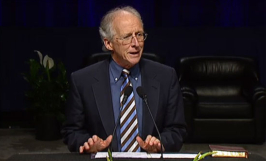Most people would see free speech as an ideal or a right to uphold, but there are signs that this is changing.
Take the recent "no-platforming" of Peter Tatchell, one of the fathers of the gay rights movement. If you'd missed this latest storm in a teacup, the gay rights officer of the National Union of Students, Fran Cowling, refused to share a stage with Tatchell in a debate. Why? Because he dared to support the right of Germaine Greer – a mother of the feminist movement – to speak her mind.
Greer has been 'no platformed' herself because she thinks that men who have had a sex change do not become women. This view isn't uncommon in feminist spheres (nor in Christian ones!) but those who share it are being ostracised by people who have adopted the latest fashion in sexual politics – battling 'transphobia'.
This implosion of the "equality" movement is strange to observe. But Tatchell doesn't even share Greer's "transphobic" views. He just firmly believes in free speech – which is why he's often sided with Christians when they've got into trouble for saying something deemed to be homophobic, even though he disagrees with them.
Of course, Christians are well aware of the trend towards clamping down on opinions that aren't politically correct. From street preachers being arrested for saying homosexuality is a sin, to Christians being sacked for not supporting gay marriage – it's been clear for some time that our society's capacity for tolerance is shrinking.
It's not just the UK. In Australia, there's soon to be a referendum on gay marriage. Some Christian groups point out that 'anti-discrimination' laws prevent them from even presenting the case against redefining marriage.
But the attack on Tatchell, whose opinions are impeccably politically correct, is a new level of intolerance. He was "no platformed" because he supported free speech, and that alone.
So why is this happening?
Those who 'no platform' or create twitter outrage are usually young, often students. Obviously there is no line in the sand. But I think that today's students grew up in a world very different to Tatchell's and Greer's. It's a world where society's conception of right and wrong has shifted focus from what we do, to the views that we hold.
Opinions, particularly if they're labelled 'right wing,' 'homophobic' or 'conservative', are what get 'educated' people upset – not actions. You don't get student protests and twitterstorms about serial killers, drink driving or the scourge of drug dealers on society. No – it's opinions that seem to be the problem, even if they are held with good intent.
If such opinion-based judgements are the main moral framework to which you've been exposed, then I think that it follows that you're going to reject free speech as an ideal. Why? If you believe in this new morality, free speech is what allows the very worst moral behaviour – the expression of incorrect opinions. It's therefore got to be wrong. The worst sin is to cause offence.
This morality based on opinions was dubbed 'virtue signalling' by James Bartholemew in this article. He links this change to the decline of Christianity in this country.
In fact, holding an opinion isn't usually seen as a problem in the Bible – what matters more is what we do, and our intentions. Jesus criticised the Pharisees for the state of their heart – their inner desires and motivations – and their behaviour. Jesus said that we shouldn't criticise, judge or look down on someone. Outrage about opinions is seen from the Pharisees rather than Jesus.
Of course, Christians have no corner on right living and can be just as intolerant. When Christians had more power, they didn't always use it wisely, nor uphold free speech. Until very recently a person could be prosecuted for blasphemy. It's worth thinking about how we treat people who disagree with us, whether Christians from a different tribe, or those with different opinions about sexuality or anything else. Do we really do the best we can to love those with whom we disagree?
If not, then we need to get our own house in order, if we've any hope of trying to influence the wider culture. In 30 years' time, when the students are the people in power – will free speech still be seen as a human right, and tolerance a virtue? Perhaps not. But we should try to keep these ideals, and live to a higher one: that of love.
Stephen Fry, another victim of the "thought police" this week, wrote: "I've heard people shriek their secularism in such a way as to make me want instantly to become an evangelical Christian."
Perhaps if we really live out the way of Christ, loving those who we disagree with, we'd be more attractive.

















